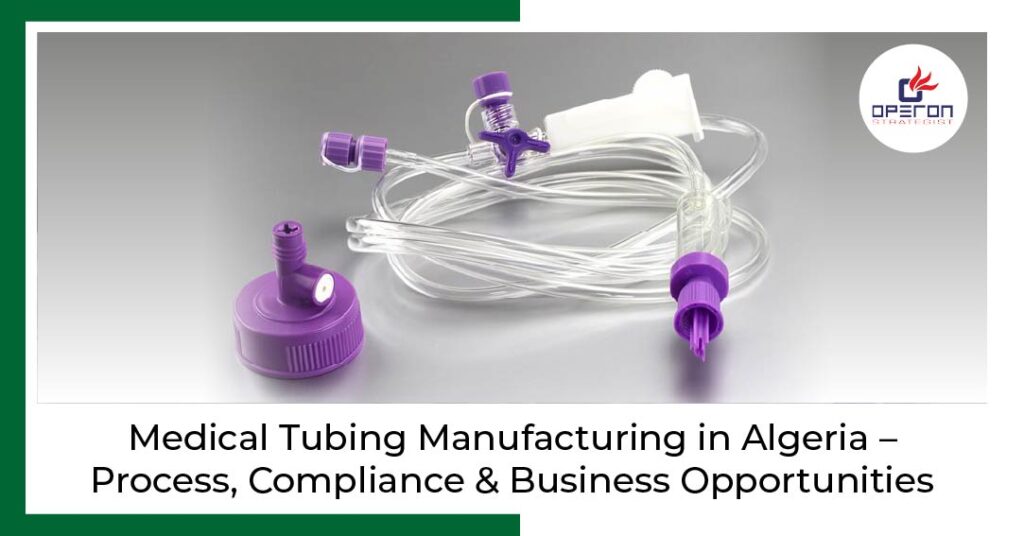The Growing Scope of Medical Tubing Manufacturing in Algeria
Medical Tubing Manufacturing in Algeria is emerging as a key sector in the country’s expanding medical device industry. Supported by government initiatives and growing healthcare infrastructure, Algeria offers ideal conditions for setting up modern tubing production facilities. These medical-grade tubing systems are vital for IV sets, catheters, dialysis kits, and respiratory equipment.
For local manufacturers and startups, the industry presents strong opportunities for domestic supply and export to the EU, USA, and Middle East. To succeed, compliance with ISO 13485, CE marking, and US FDA 510(k) standards is essential.
Looking For a Medical Device Regulatory Consultant?
Why Medical Tubing Manufacturing Matters
Medical tubing is a critical component used in a variety of life-saving medical devices, including:
- Intravenous (IV) infusion sets
- Catheters and feeding tubes
- Dialysis and blood transfusion equipment
- Ventilators and respiratory systems
- Surgical and diagnostic instruments
As Algeria’s healthcare and hospital network continues to expand, so does the demand for safe, sterile, and disposable medical tubing. Manufacturers who invest now can gain a significant edge in both the local and export markets.
Step-by-Step Medical Tubing Manufacturing Process
Medical tubing manufacturing requires precision, controlled environments, and compliance with international medical device standards such as ISO 13485 and FDA 21 CFR Part 820. Below is the process breakdown followed by industry best practices.
1. Material Selection
The first step in producing high-quality medical tubing is choosing the right medical-grade material. The material depends on the device’s application, flexibility, and sterilization requirements. Common materials include:
- PVC (Polyvinyl Chloride): Cost-effective and flexible, used for IV sets and catheters.
- Silicone: Biocompatible, durable, and heat resistant — ideal for surgical and implantable devices.
- Polyethylene (PE) and Polypropylene (PP): Lightweight and chemically resistant materials.
- Thermoplastic Elastomers (TPE): Recyclable, flexible alternatives gaining popularity.
All materials should comply with ISO 10993 biocompatibility testing and be approved for medical use by recognized authorities.
2. Extrusion Process
Most medical tubing in Algeria will be produced using advanced extrusion technology. The process includes:
- Feeding polymer pellets into an extruder.
- Melting and shaping the material through a precision die.
- Cooling and solidifying the tubing in a controlled environment.
- Using pullers and cutters to maintain consistent wall thickness and dimensions.
Modern extrusion lines allow production of single-lumen, multi-lumen, co-extruded, or braided tubing, depending on the end-use application.
3. Secondary Processing
Once the extrusion is complete, the tubing undergoes secondary operations to enhance its functionality and integration into medical devices. These include:
- Cutting and sizing
- Printing, marking, or color-coding
- Flaring or tipping
- Bonding and adding connectors or fittings
All secondary processes are carried out under cleanroom conditions (ISO Class 7 or 8) to maintain sterility.
4. Sterilization and Packaging
To ensure patient safety, sterilization is a critical final step. Common methods include:
- Ethylene Oxide (EtO) sterilization
- Gamma irradiation
- Steam autoclaving (for heat-resistant materials)
The tubing is then packaged in sterile barrier systems that maintain integrity until use. Packaging is usually done in ISO 14644-compliant cleanrooms.
Regulatory Requirements for Medical Tubing Manufacturing in Algeria
Manufacturers in Algeria must comply with both local and international medical device regulations to ensure product quality and export readiness.
Local Regulatory Compliance
- Governed by the Ministry of Pharmaceutical Industry (MIP) and the Agence Nationale des Produits Pharmaceutiques (ANPP).
- Medical tubing classified as a Class I or II medical device (depending on its application).
- Compliance with Good Manufacturing Practices (GMP) and ISO 13485 Quality Management System is mandatory.
Export Compliance
If the tubing is intended for export to other markets:
- CE Marking (Europe): Requires conformity with the EU MDR (2017/745).
- US FDA 510(k): Required if tubing is sold as a component or finished device in the U.S.
- UKCA Marking (UK): Applicable for exports to the United Kingdom.
Business Opportunities in Medical Tubing Manufacturing
The medical tubing market in Algeria is witnessing rapid growth due to several factors:
- Expansion of hospital and diagnostic infrastructure
- Rising demand for disposable medical devices
- Growth in home healthcare and chronic disease management
- Government incentives promoting local manufacturing and exports
Manufacturers can explore diverse business segments such as:
- IV and catheter tubing production
- Dialysis and transfusion equipment tubing
- High-performance tubing for surgical or implantable devices
- Custom tubing for drug delivery or diagnostic use
Investing in this sector not only supports import substitution but also opens export pathways to Africa, Europe, and the Middle East.
Challenges in Medical Tubing Manufacturing
While profitable, the industry poses challenges such as:
- Complex regulatory approval processes
- Maintaining consistent product quality and sterility
- Need for cleanroom infrastructure and skilled labor
- Initial investment in extrusion and sterilization technology
Partnering with an experienced medical device turnkey consultant helps mitigate these challenges and ensures faster, compliant facility setup.
Ready to Start Your Medical Tubing Manufacturing Project in Algeria?
How Operon Strategist Can Help
At Operon Strategist, we offer end-to-end consulting for medical tubing manufacturing projects in Algeria. Our services include:
- Facility design and cleanroom layout planning
- Regulatory support for ISO 13485, CE marking, and FDA 510(k)
- Quality Management System (QMS) implementation and documentation
- Vendor selection for extrusion machinery, raw materials, and sterilization equipment
- Turnkey project setup, from concept to commercial production
With extensive experience in global medical device consulting, we help Algerian manufacturers build compliant, efficient, and export-ready production units.
